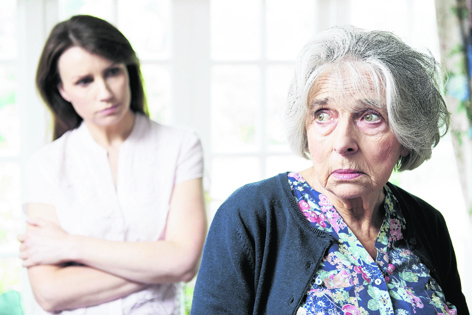Depression and exhaustion are common for those caring for loved ones with dementia – so putting your own needs first isn’t selfish, it’s essential
Dementia rates are believed to be on the rise, with around 850,000 people in the UK already diagnosed with some form of the condition.
The number of people ‘living with’ dementia however is far higher. Because, as with many conditions, it isn’t an illness that only impacts the person who actually has it.
Dementia affects those around them too, especially the spouses, partners and relatives who become carers for their loved one, as the recent tragic case of Meryl and Michael Parry – who killed his wife and later himself, reportedly after struggling to cope with her dementia – highlights.
Extreme cases like this are rare, but it’s important – as carers, medical professionals and as a society – to be aware of carers’ needs, and know that support is just as vital as diagnosis.
IT CAN BE EXHAUSTING
Recent research by Alzheimer’s Society revealed that most GPs believe their patients with dementia have to rely on families and unpaid carers.
“While there are positive aspects of caring, such as learning new skills, strengthening relationships and supporting someone who is important to you, it can also be both physically and mentally exhausting,” says George McNamara, head of policy and public affairs at Alzheimer’s Society.
 “Sadly it can be common for carers to struggle, and many experience stress and depression,” adds Susan Drayton, clinical lead for Admiral Nursing DIRECT at Dementia UK.
“Sadly it can be common for carers to struggle, and many experience stress and depression,” adds Susan Drayton, clinical lead for Admiral Nursing DIRECT at Dementia UK.
“Dementia can still have negative connotations and many people are unaware of the support and services available. Older carers can also have their own complex physical and emotional needs which can add to the challenges of caring for a spouse with dementia.”
SUPPORT IS OUT THERE
Just acknowledging that being a carer can be challenging, and that it’s normal to find it a struggle at times, can make a big difference to people, but actual support is also very important.
“A simple phone call to a specialist, like one of our Admiral Nurses on our helpline, can help carers feel less isolated, and we can also point them in the direction of local support services,” says Drayton.
 “Our helpline is staffed by expert Admiral Nurses who provide practical and emotional support for family carers, as well as health professionals. We’ve seen a 78% increase in calls over the last year, and callers have described the helpline as a ‘lifeline’ when they’ve needed support.”
“Our helpline is staffed by expert Admiral Nurses who provide practical and emotional support for family carers, as well as health professionals. We’ve seen a 78% increase in calls over the last year, and callers have described the helpline as a ‘lifeline’ when they’ve needed support.”
YOU’RE NOT ALONE
Talking openly about how you’re coping and feeling doesn’t come naturally for everybody, but talking to others who are going through – or have previously been through – similar situations, can be immensely helpful.
And even if you don’t want to ‘open up’ about your personal situation immediately, just spending time with other carers and people who understand what living with dementia is like can be a big relief and confidence boost.
“Many find it helpful to talk about their feelings with their friends and family or those in a similar situation. Online forums such as Alzheimer’s Society Talking Point can be a useful source of support and practical suggestions, or simply a place for carers to let off steam after a difficult day,” says McNamara.
“Other types of support include local groups, which can be found through our website. GPs, counsellors and other professionals can also offer support.”
FEELING GUILTY IS NORMAL – BUT NOT NECESSARY
Being a good carer does not mean you should never admit that you need a break, a change of scene or that you’d like some time to yourself. In fact, while it’s totally normal to feel guilty about these things, it’s actually extremely important that carers do look after their own needs too – and that means having some time off, even if it’s just a few hours here and there to go for a walk, enjoy a hobby, or simply have a bath, eat a meal and watch TV uninterrupted.
“Guilt is very common, carers can feel they’re never doing enough for the person they’re caring for,” says Drayton. “But it is so important that carers look after themselves, by talking to someone and accessing services that support them.
“By investing in the health and wellbeing of carers, who provide the lion’s share of care, we in turn are then providing better care for the person with dementia.
“It’s important that carers don’t feel they have to cope on their own.”
HELP AT HAND
The Admiral Nursing DIRECT helpline is open Monday to Friday, 9.15am-4.45pm and on Wednesday and Thursday evenings, 6pm-9pm, on 0845 257 9406. Or you can e-mail direct@dementiauk.org
Find Alzheimer’s Society Talking Point online forum at www.alzheimers.org.uk/talkingpoint

